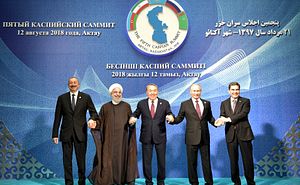Over the weekend, the presidents of Azerbaijan, Iran, Kazakhstan, Russia, and Turkmenistan met in Aktau, Kazakhstan to sign the much-anticipated convention on the legal status of the Caspian Sea. While the convention appears to settle some of the big questions regarding the resource-rich sea, as Bruce Pannier notes, the meeting delivered less than expected.
Ultimately, the Caspian will always be captive to the interests of the five littoral states and those five states, while often in agreement, have divergent interests in several important areas.
The core dispute over the Caspian can be summarized simply: Is it a lake or a sea? The terminology matters because it dictates how the littoral states use the body of water and how the Caspian’s resources are divvied up. And those resources are significant. The U.S. Energy Information Agency (EIA) estimated in 2012 that there were 48 billion barrels of oil and 292 trillion cubic feet of natural gas in proved and probable reserves in the Caspian basins.
Until 1991, the Caspian had only two littoral states — the Soviet Union and Iran — which treated the Caspian as a border lake, with their 1921 Treaty of Friendship focusing largely on navigation rights and referencing natural resources only in regards to fishing. With the Soviet Union’s collapse as well as the discovery of valuable resources in the basin, the interests of the littoral states diversified.
If deemed a “sea” the United Nations Convention on Law of the Sea (UNCLOS) would apply. Each littoral state would have a territorial sea of up to 12 nautical miles, an exclusive economic zone (EEZ), and a continental shelf. The bounds of the EEZs would be set based on a median line. If deemed a “lake” customary international law governing border lakes would apply, with legal agreements between the bordering states regulating use of the water.
Iran, in particular, has long resisted determining the Caspian a “sea” because Iran’s corner of the Caspian is the deepest, saltiest and least resource-rich. Iran long pushed for an equal division of the Caspian’s resources: 20 percent each of the seafloor and the surface. This was opposed by Kazakhstan, in particular, as the Kazakh corner of the Caspian has some of the richest oil and gas fields.
It’s important to point out that while the littoral states have been negotiating since 1996 on the Caspian’s status, the existing ambiguity has not stopped Azerbaijan, Kazakhstan, Russia, and Turkmenistan from exploiting the resources off their coasts.
A draft of the agreement viewed by RFE/RL suggested the parties would agree at Aktau to the Caspian’s status as a “sea.” The New York Times reported that the agreement takes a compromise approach, treating the surface as international water (i.e. a sea) and dividing the seabed into territorial zones, along the lines of a lake.
Iranian President Hassan Rouhani reportedly said further talks would been necessary to divide up the seabed’s resources, indicating that even after 22 years the Caspian’s status is not completely set yet.
Crucially, the recent agreement may open the door to pipeline projects that have long been hostage to the ambiguity surrounding the Caspian’s status. The convention reportedly stipulates that only countries through which a pipeline crosses would have to agree on the construction. The Trans-Caspian Pipeline (TCP), from Turkmenistan to Azerbaijan, has been opposed by both Russia and Iran. Russian and Iranian opposition has nominally (and rather unconvincingly) been rooted in environmental concerns; many analysts viewed Moscow and Tehran’s opposition as economically motivated, an effort to keep Turkmenistan from connecting to the European gas market via Azerbaijan.
Another feature of the agreement that has wider implications is a prohibition on military vessels from non-littoral states in the sea. In his closing remarks, Rouhani reportedly praised this aspect of the agreement but suggested that the prohibition on foreign military presence in the sea should extend to the shipment of foreign military cargo.
The United States has agreements in place with Azerbaijan and Kazakhstan to ship military cargo from Baku to ports in Aktau and Quryq in Kazakhstan. From there, the cargo is taken by rail to Afghanistan, where the United States has been militarily engaged since 2001.
The convention, an agreement 22 years in the making, is a big deal, but I’ll cast my analytical lot in with Pannier and agree that there remain many questions and future negotiations appear necessary. The most difficult hurdle was always going to be how to divide the sea’s valuable resources, and that hurdle remains. That said, the agreement and ensuing fanfare ought to provide motivation and momentum for the littoral states to work out the remaining details.
































